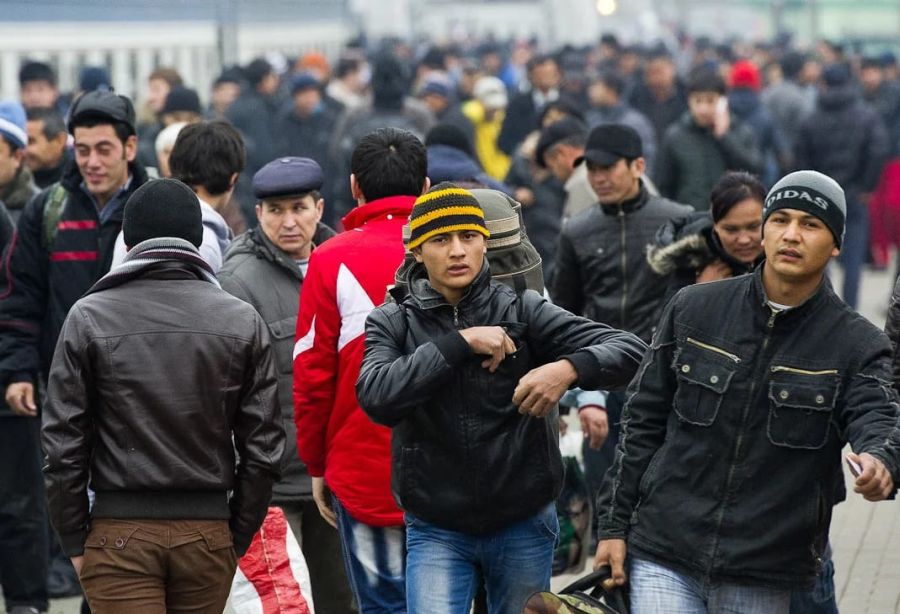New CSTO plan to stop illegal immigration in Russia
The Eurasian military alliance has presented new guidelines for law enforcement operations to be applied in all member states to prevent ‘terrorist infiltration’. Last year 420 illegal organisations were identified, but there were also many summary actions against Tajiks after the attack on Krokus City Hall. Dushanbe is insisting that its citizens fully legalise their residence status in Russia by the end of April.
Moscow (AsiaNews) - The secretariat of the Eurasian military alliance, CSTO, has presented its plan for regional operations to combat illegal immigration this year, called Nelegal-2025, to be applied in all the territories of the member states Belarus, Kazakhstan, Russia, Kyrgyzstan, Tajikistan and Armenia, even if the status of the latter is currently ‘frozen’. The channels through which these migratory flows develop must be identified and blocked, putting an end to illegal practices.
The organisational managers of the national staff have agreed on the timing and methods of the operations to be carried out in parallel, with a detailed exchange of information.
The plan involves several stages, with the aim of ‘achieving a stabilisation of the migratory situation, avoiding the dangers of terrorist infiltration’, as stated in the CSTO press release.
A similar initiative was held last year, which revealed more than 13,000 violations of migration legislation in Moscow alone, with more than 10,000 foreigners accused of breaking the rules of entry, exit and stay in the territory of the Russian Federation, and also for not having respected the established order for being able to carry out work activities in Russia.
The previous Nelegal-2024 action was activated in September, and 420 cases of organised illegal immigration were identified. The Tajikistan authorities in particular had repeatedly and publicly addressed the Russian counterpart, protesting against violations of the rights of Tajik citizens in Russia, and in the intergovernmental session held in Dushanbe in October, Prime Minister Kokhir Rasulzoda appealed to the Russians against the continuous checks, searches and arrests with summary procedures against Tajiks, largely due to the effects of the attack on Krokus City Hall in March, attributed to Tajik Islamic terrorists.
Rasulzoda complained that ‘with vague assurances of security, people are held at the border for hours, sometimes for days’, including students, the elderly, children and members of official delegations.
Russian Deputy Prime Minister Marat Khusnullin also recognised the need to create a working group between Russia and Tajikistan to control migration, and the Tajikistan Foreign Minister, Sirodžiddin Mukhriddin, speaking at the CIS Council of Ministers, once again expressed concern about the continuous restrictions on the rights of Tajik citizens, with measures that ‘contradict the principles of humanism and mutual support, which are the fundamental values of the Commonwealth of Independent States’.
For all these reasons, the decision to entrust the CSTO with a broader and more detailed plan regarding migration issues could offer more convincing answers for everyone, not only guaranteeing Russia's security, but also giving the possibility of regulating the migratory and labour flows, which are so necessary for the countries of Central Asia to support their families, and for Russia itself to fill labour shortages.
The Tajikistan institutions are therefore insisting that their citizens fully legalise their conditions of stay in Russia by the end of April, and carry out the necessary checks on entry permits and all documentation in their own country.
In addition to an entry visa, in Russia it is now necessary to register at the place of residence and obtain a ‘work permit’ which requires a monthly payment, and registration in the archive of persons under control, with a verification agreed between the ministries of labour and the organisations concerned in the two countries involved, the country of origin and the country where the activities take place.
In case of non-compliance with all the rules, they are marked on the ‘deportation register’, and after repatriation they will be banned from entering Russia for a period of 3 to 10 years. Tajikistan has also opened consultation offices, with telephone numbers always available, to give everyone the opportunity to avoid imperfections and violations that would close the doors of Russia.
07/02/2019 17:28
12/02/2016 15:14
11/08/2017 20:05







.png)










